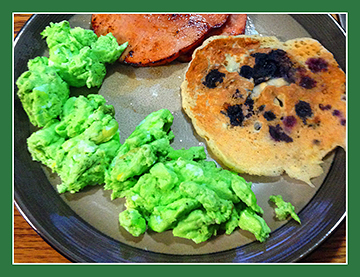St. Patrick’s Day, spring green, and the triumph of good
COFFEE WITH WARREN, with Warren Harbeck
Cochrane Eagle, March 17, 2016

Green eggs, ham and a side-order of blueberry pancakes were on last Sunday’s featured menu served by columnist’s granddaughter, Naomi Toms. Photo by Naomi Toms
It’s that time of year again: green party decorations, green face-painting, green beer! But green eggs and ham, too?
Or at least, green eggs? That’s what my always-delightful granddaughter and avid Dr. Seuss fan, B.C. author Naomi Toms, served her colour-savvy husband Al this past weekend.
And of course, as soon as I received her photo, I was reminded immediately of St. Patrick’s Day.
Aye! That fourth-century Irish Christian saint celebrated on March 17 is legendary for having driven out all the snakes from the beautiful green countryside of the Emerald Isle. To be sure, scholars debate whether there ever were any snakes there in the first place, but that’s another matter.
One thing that is not debatable, however, is the way this happiness holiday has become a wonderful way to drive out the winter blahs and welcome the triumph of spring. And just think, even the grass in our Bow Valley is once more joining this celebration of greenness.
Aye! Happy days are here again.
But of course, this seasonal happiness isn’t limited to things Irish. And among world religions, it’s not just about Christianity.
March 20 is the vernal equinox, important among our Baha’i neighbours as Naw-Rúz, New Year.
As our Cochrane coffee companion Pat Verge, a member of the Baha’i Faith, explains:
“Naw- Rúz is a joyous time, as it is the beginning of spring. It comes after 19 days when Baha'is observe a period of fasting (March 1–19 this year). They abstain from food or drink during daylight hours.
“The fast is essentially a period of meditation and prayer, of spiritual recuperation. It is symbolic and a reminder of abstinence from selfish desires in preparation for the new year of growth and of possibilities for new developments and progress in the world.”
In Judaism, what is widely regarded as the most fun-filled day of the whole year is Purim, celebrated on the 14th day of Adar in the Hebrew calendar (March 24 this year, beginning at sundown the previous evening).
Celebrated with acts of charity, gift exchanges, music, humour and copious refreshments, the day commemorates the triumph of good over evil in the fifth century B.C. It’s about how Queen Esther, who had kept her Jewish identity secret until history left her no choice but to reveal herself for the sake of her people – even at the risk of losing her own life –, got one up on the arrogant prime minister Haman (stomp, stomp!) who had schemed to wipe out all the Jews in Persia during the reign of King Ahasuerus.
Haman (stomp, stomp!) had even built a gallows for hanging the Jew he hated most, the man who had raised Esther, her kin Mordecai, only to have the king hang Haman (stomp, stomp!) himself on it when his treachery was uncovered. (See the short story of Esther in the Old Testament).
And why the stomp, stomp? The synagogue service on Purim features the reading of the entire book of Esther, and whenever wicked Haman’s name would be mentioned, the whole congregation drowns out his despicable name with noise makers (for example, groggers) and the stomping of feet. What a way to put a smile on your face!
For Christianity, of course, this Sunday, known as Palm Sunday or Passion Sunday, marks the beginning of Holy Week, commencing with Jesus’ joyful entry into Jerusalem, His crucifixion (Good Friday), and His triumphal resurrection (Easter) when He, too, got one over on wickedness. But more about that in next week’s column.
In wrapping up this week’s column, I must return to things Irish for a moment, and to a Cochrane author with deep Irish roots who champions the triumph of life’s springtime green over winter.
Retired pastor Tony Hilling has just published his latest book in his series, The Voice of Aedistamen. The Celtic-flavoured fantasies also celebrate the triumph of good over evil. He assures me that this novel should “warm the hearts of the Irish and pseudo-Irish” alike. You can order the digital edition of the Aedistamen series online from Amazon. And aye, a good read it promises to be indeed.
© 2016 Warren Harbeck
JoinMe@coffeewithwarren.com